|
BACKGROUND
DEFINITION OF TERMS (For Serious Students)
COVENANT
LAW
LAW
I. In the Old Testament
II. In the New Testament
GRACE
GRACE, MEANS OF
KINGDOM OF GOD
KINGDOM OF GOD, KINGDOM OF HEAVEN
I. In John the Baptist
II. In the teaching of Jesus
III. Kingdom and church
IV. In the rest of the New Testament
V. In theological thought
The
full background to this teaching is available online at this link
<b>DEFINITION OF TERMS</b> (For Serious Students)
|
Online links to scriptures (New International Version [NIV] unless otherwise stated) are shown in blue
| MEASUREMENT OF SUCCESS |
|
___________THE THREE KINGDOM AGES__________
THEME______PATRIARCHS__PROPHETS___PEOPLE___
_______________Creation_____c.1500BC______c.5BC___
_______________c.1800BC_____c.432BC___Jesus Return
SOCIETY_______Nomadic_____Agrarian___Developmental
REACHING_______Family_______Nation________World
SALVATION___Righteousness____Law_________Grace
PRIESTHOOD__Melchizedek_____Aaron________Jesus
SUCCESS BY_Reproduction__Prosperity___Sacrifice
|
| PROMISE OF LIFE |
|
 God created the earth as a place of habitation for the human race. For you and me to live in and look after. God created the earth as a place of habitation for the human race. For you and me to live in and look after.
Genesis 1:26-7
|
|
|
Obviously, Adam and Eve couldn't do this all by themselves, so the emphasis of the first kingdom age was upon reproduction, on life itself, upon filling the earth with people.
Genesis 1:28
|
|
|
 After dealing with the fall of man in Genesis Chapter 3, this historical record concentrates upon the reproduction of the human race. Starting with Adam and Eve's family. After dealing with the fall of man in Genesis Chapter 3, this historical record concentrates upon the reproduction of the human race. Starting with Adam and Eve's family.
Genesis 4:1-2
|
|
|
 Then, moving on in the next chapter, through the family tree from Adam to Noah. Then, moving on in the next chapter, through the family tree from Adam to Noah.
Genesis 5:1-5
|
|
|
 After dealing once again with sin through the Flood, God reiterated His promise of life. After dealing once again with sin through the Flood, God reiterated His promise of life.
Genesis 9:1
|
|
|
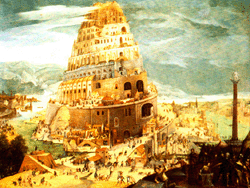 Mankind's family tree was disturbed again by God's dealing with sin in the story of the Tower of Babel. This time however, instead of destroying the people as during the Flood, God dispersed them to new areas. Mankind's family tree was disturbed again by God's dealing with sin in the story of the Tower of Babel. This time however, instead of destroying the people as during the Flood, God dispersed them to new areas.
Genesis 11:9
|
|
|
 The family tree extended from Shem to Abram. Abraham, as he was to become, received (after Adam and Eve) the greatest promise of life as the literal father of the nation Israel, and the spiritual father of the gentiles. The family tree extended from Shem to Abram. Abraham, as he was to become, received (after Adam and Eve) the greatest promise of life as the literal father of the nation Israel, and the spiritual father of the gentiles.
Genesis 12:1-2
|
|
|
The story of Abraham is all about life. Life that he and Sarah were unable to produce by themselves in the natural, (in spite of trying to do it their way, with Ishmael) but which God promised them supernaturally (an old man and a post menopausal woman) in the person of Isaac.
Genesis 17:17-19
|
|
|
 So, after another battle with sin in Sodom and Gomorrah, resulting in their destruction, Isaac was born. So, after another battle with sin in Sodom and Gomorrah, resulting in their destruction, Isaac was born.
Genesis 21:1-3
|
|
|
 After proving his obedience through the aborted sacrifice of his son and heir, through whom the promise of life had to be fulfilled, God confirmed the undertaking He had given. After proving his obedience through the aborted sacrifice of his son and heir, through whom the promise of life had to be fulfilled, God confirmed the undertaking He had given.
Genesis 22:15-18
|
|
|
The story of life, transmitted through the family line of the Patriarchs, the seed of Abraham, continues right to the end of Genesis. The book comes towards a close as Jacob blesses his sons, immediately prior to his death in Egypt.
Genesis 49:1-2
A kingdom age oriented around life, life though the family, life centered upon reproduction, in order to "fill the earth."
|
| PROMISE OF PROSPERITY |
|
 The second kingdom age is based round the ups and downs of the nation state of Israel. The 'state of the nation' depended upon the Jews obedience to God's instructions. When obedient, God promised prosperity. The second kingdom age is based round the ups and downs of the nation state of Israel. The 'state of the nation' depended upon the Jews obedience to God's instructions. When obedient, God promised prosperity.
Deuteronomy 28:9-12
|
|
|
 But for disobedience, curses would prevail. But for disobedience, curses would prevail.
Deuteronomy 28:15-19
In essence then, the nation of Israel would inherit the Promised Land, with its attendant riches, as long as they honored God and did things His way. But for forgetting God, by worshipping idols and trying to succeed in human strength, the punishment would be oppression, poverty and exile. The books of Exodus to Malachi tell of the peoples successes and failures. From the glory of Solomon to the despair of exile to Babylon, we read of the ebbs and flows of Jewish experience during a period of 1000+ years in their history, from round 1500BC to 432BC.
We learn of the initial success of conquest under Joshua, then the ups and downs of the Judge's times. Through difficulties under the human approach of King Saul, more conquests by King David, and topped off by the ultimate glory of Solomon. However the reign of Solomon sowed the seeds of destruction for the decline that was to follow. We see the splitting of the land into two, Israel and Judah. A succession of kings, mostly bad, was punctuated by a few who honored God. This resulted in the elimination of Israel by the Assyrians, followed 164 years later by the fall of Jerusalem and the final exile of Judah to Babylon. The story ends with the return of a remnant to Jerusalem and the surrounding areas after 70 years of exile, there to live in, what was often miserable subjection, to a series of conquerors. Yes, it is a sad story of the physical destruction of the Promised Land through the people's disobedience.
|
|
|
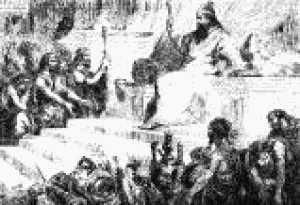 HEIGHT OF THE KINGDOM HEIGHT OF THE KINGDOM
The extent and wealth of Israel under Solomon are legendary. As the major regional power its influence also extended over a wide area outside of its borders. In these days the King was the epitome of the nation. So the glory of Solomon represented the strength of the nation.
1 Kings 4:20-28
|
|
|
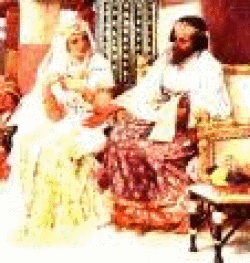 His glory was highlighted by the visit of the Queen of Sheba. Her report and reaction follows. His glory was highlighted by the visit of the Queen of Sheba. Her report and reaction follows.
1 Kings 10:6-10
|
|
|
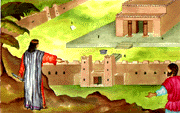 This prosperity too, was reflected in the glory of the Temple. Both the building and its furnishings reflected the wealth of the kingdom. This prosperity too, was reflected in the glory of the Temple. Both the building and its furnishings reflected the wealth of the kingdom.
1 Kings 7:48-51
|
|
|
Worship reflected the kingdom's prosperity as well, illustrated by the sacrifices made at the dedication of the Temple.
1 Kings 8:62-3
|
|
|
SEEDS OF ITS DESTRUCTION
But the kingdom's prosperity also contained the seeds of its destruction. The Lord warned Solomon about this after he had completed his two major building projects, the Temple and his palace.
1 Kings 9:6-9
|
|
|
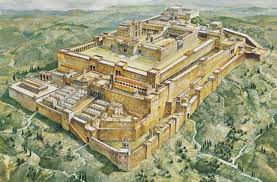 In fact, in spite of all his wisdom, the first indication of Solomon's true priorities can be seen in the time spent building his palace as opposed to the Temple. In fact, in spite of all his wisdom, the first indication of Solomon's true priorities can be seen in the time spent building his palace as opposed to the Temple.
1 Kings 6:38-7:1
|
|
|
 There is a well-known saying that the 3 'G's 'of 'girls, gold and glory' lead men astray. And so it was. The temptations of the flesh proved to be irresistible to Solomon too and he turned away from God. There is a well-known saying that the 3 'G's 'of 'girls, gold and glory' lead men astray. And so it was. The temptations of the flesh proved to be irresistible to Solomon too and he turned away from God.
1 Kings 11:1-8
|
|
|
So the country had to pay the consequences, not in his generation but in the ones to follow.
1 Kings 11:9-13
The second kingdom age, one based on prosperity, ended in destruction, poverty, and subjection to foreign powers. A new way was needed.
|
| PROMISE OF SACRIFICE |
|
 He came offering a new and better covenant of reconciliation with the Father. He came offering a new and better covenant of reconciliation with the Father.
Hebrews 9:15
|
|
|
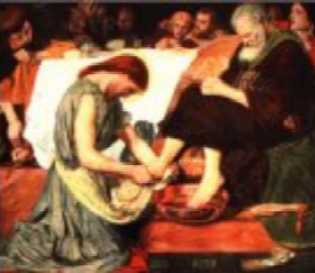 As Jesus did for us, so we are to sacrifice ourselves for others. As Jesus did for us, so we are to sacrifice ourselves for others.
1 John 3:16
|
|
|
 This was literally true for 10 out of the 11 remaining Disciples. All except John were martyred! And he ended up banished to the Island of Patmos. Certainly no holiday resort! This was literally true for 10 out of the 11 remaining Disciples. All except John were martyred! And he ended up banished to the Island of Patmos. Certainly no holiday resort!
I was blessed to visit the site where doubting Thomas, who had by then had lost his doubts, first ministered, in the west of India. There was a Roman Catholic Church on the site and a real presence of God's Spirit pervaded the area. Thomas was martyred on the Eastern side of the continent, near Chennai, formerly Madras. He sacrificed his life for his Lord.
Jesus promised us trouble in this life. Which can be overcome through Him.
John 16:33
|
|
|
 He reminisces about his life, but ends up, as always, with a statement of victory in Jesus. He reminisces about his life, but ends up, as always, with a statement of victory in Jesus.
2 Corinthians 11:23-33
|
|
|
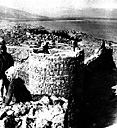 Through John, Jesus spoke to the church in Smyrna about suffering, one of only 2 of the 7 churches He didn't directly criticize. Through John, Jesus spoke to the church in Smyrna about suffering, one of only 2 of the 7 churches He didn't directly criticize.
Revelation 2:8-10
|
|
|
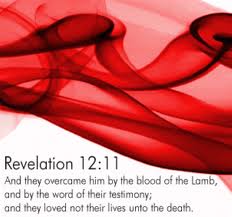 If we wish to be those who have the power to overcome satan, sacrifice 'unto death' (Natural and/or spiritual) is required. If we wish to be those who have the power to overcome satan, sacrifice 'unto death' (Natural and/or spiritual) is required.
Revelation 12:11
Yes, today we moved from the Old Testament promise of prosperity to the New Covenant promise of sacrifice. The word 'prosperity' and its derivatives, (Prosper, prospers, prosperous) appear 80 times in the NIV translation, 79 times in the Old Testament and only once in the New. (Acts 13:17) And this verse too, refers to the Old Testament! Surely a persuasive indication that the promise has changed, is it not?
Are we prepared to make the sacrifice?
|
| <i>NEXT WEEK:</i> A REVELATION OF....... 3 KINGDOM AGES
THE PRINCIPLE OF SACRIFICE |
|
 The core of our relationship with God centres round 'sacrifice'. Next week we will see how the methods of sacrifice changed through the 3 kingdom ages. The core of our relationship with God centres round 'sacrifice'. Next week we will see how the methods of sacrifice changed through the 3 kingdom ages.
|
| A NOTE FROM DAVID |
|
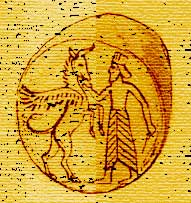 In our humanity, we all, or nearly all, desire to be prosperous, preferably wealthy, as well as godly! So we are drawn back, as with a magnet, to the measure of success of the second kingdom age. Don't we really, in our heart of hearts, want to be like King Solomon - wise and wealthy? But what came of him? He was entrapped by the world and fell away from God, in spite of being the wisest man who ever lived! What hope is there for us then, when placed in the same situation? Very little. In our humanity, we all, or nearly all, desire to be prosperous, preferably wealthy, as well as godly! So we are drawn back, as with a magnet, to the measure of success of the second kingdom age. Don't we really, in our heart of hearts, want to be like King Solomon - wise and wealthy? But what came of him? He was entrapped by the world and fell away from God, in spite of being the wisest man who ever lived! What hope is there for us then, when placed in the same situation? Very little.
Yet Christians are constantly being seduced by worldly based teachings promising material prosperity to believers.
The call of the New Covenant, the measure of our success today, is found, not in material properity but in both material and spiritual sacrifice. Jesus gave His all for us and we are to give our all for Him and for others. The extent of our sacrifice is the sign of our dedication to our Lord and the true measure of success in our walk with Jesus.
SEALS AND SIGNETS
The ancient seal was a stamp or engraving set in stone, metal or some hard substance like crystal. It was usually a symbol or a figure that was used to make an impression on clay or wax, or some other soft substance. It was usually attached to an object like a possession or a document, in order to give it authenticity, ownership or authority. It was used often in the ancient world, especially in Egypt, Babylonia and Assyria and surrounding nations including Israel.
Illustrated: Seal of Chalcedony, with Persian Inscription (Original is in British Museum)
Source:http://www.bible-history.com
|
So until next week.......
MAY GOD BLESS YOU AND YOU BLESS GOD!
His servant and yours

Learn more about us at...
www.wwj.org.nz/about.php
|
A DAVID'S DOODLING
725. Jesus freely gave His life for us on the Cross. He invites us to freely give our lives back to Him in return.
David Tait
|
Check
out the WWJ website for….
More David's Doodlings: www.wwj.org.nz/dd.php
Life's a Laugh: http://www.wwj.org.nz/lifelaugh.php
Links to other sites of interest: http://www.wwj.org.nz/links.php
Till Death do us Part!: http://www.wwj.org.nz/tddup.php
Pets Rule!: http://www.wwj.org.nz/pets.php
|

 God created the earth as a place of habitation for the human race. For you and me to live in and look after.
God created the earth as a place of habitation for the human race. For you and me to live in and look after.  After dealing with the fall of man in Genesis Chapter 3, this historical record concentrates upon the reproduction of the human race. Starting with Adam and Eve's family.
After dealing with the fall of man in Genesis Chapter 3, this historical record concentrates upon the reproduction of the human race. Starting with Adam and Eve's family.  Then, moving on in the next chapter, through the family tree from Adam to Noah.
Then, moving on in the next chapter, through the family tree from Adam to Noah.  After dealing once again with sin through the Flood, God reiterated His promise of life.
After dealing once again with sin through the Flood, God reiterated His promise of life.  Mankind's family tree was disturbed again by God's dealing with sin in the story of the Tower of Babel. This time however, instead of destroying the people as during the Flood, God dispersed them to new areas.
Mankind's family tree was disturbed again by God's dealing with sin in the story of the Tower of Babel. This time however, instead of destroying the people as during the Flood, God dispersed them to new areas.  The family tree extended from Shem to Abram. Abraham, as he was to become, received (after Adam and Eve) the greatest promise of life as the literal father of the nation Israel, and the spiritual father of the gentiles.
The family tree extended from Shem to Abram. Abraham, as he was to become, received (after Adam and Eve) the greatest promise of life as the literal father of the nation Israel, and the spiritual father of the gentiles.  So, after another battle with sin in Sodom and Gomorrah, resulting in their destruction, Isaac was born.
So, after another battle with sin in Sodom and Gomorrah, resulting in their destruction, Isaac was born.  After proving his obedience through the aborted sacrifice of his son and heir, through whom the promise of life had to be fulfilled, God confirmed the undertaking He had given.
After proving his obedience through the aborted sacrifice of his son and heir, through whom the promise of life had to be fulfilled, God confirmed the undertaking He had given.  The second kingdom age is based round the ups and downs of the nation state of Israel. The 'state of the nation' depended upon the Jews obedience to God's instructions. When obedient, God promised prosperity.
The second kingdom age is based round the ups and downs of the nation state of Israel. The 'state of the nation' depended upon the Jews obedience to God's instructions. When obedient, God promised prosperity.  But for disobedience, curses would prevail.
But for disobedience, curses would prevail.  HEIGHT OF THE KINGDOM
HEIGHT OF THE KINGDOM His glory was highlighted by the visit of the Queen of Sheba. Her report and reaction follows.
His glory was highlighted by the visit of the Queen of Sheba. Her report and reaction follows.  This prosperity too, was reflected in the glory of the Temple. Both the building and its furnishings reflected the wealth of the kingdom.
This prosperity too, was reflected in the glory of the Temple. Both the building and its furnishings reflected the wealth of the kingdom.  In fact, in spite of all his wisdom, the first indication of Solomon's true priorities can be seen in the time spent building his palace as opposed to the Temple.
In fact, in spite of all his wisdom, the first indication of Solomon's true priorities can be seen in the time spent building his palace as opposed to the Temple.  There is a well-known saying that the 3 'G's 'of 'girls, gold and glory' lead men astray. And so it was. The temptations of the flesh proved to be irresistible to Solomon too and he turned away from God.
There is a well-known saying that the 3 'G's 'of 'girls, gold and glory' lead men astray. And so it was. The temptations of the flesh proved to be irresistible to Solomon too and he turned away from God.  He came offering a new and better covenant of reconciliation with the Father.
He came offering a new and better covenant of reconciliation with the Father.  As Jesus did for us, so we are to sacrifice ourselves for others.
As Jesus did for us, so we are to sacrifice ourselves for others.  This was literally true for 10 out of the 11 remaining Disciples. All except John were martyred! And he ended up banished to the Island of Patmos. Certainly no holiday resort!
This was literally true for 10 out of the 11 remaining Disciples. All except John were martyred! And he ended up banished to the Island of Patmos. Certainly no holiday resort! 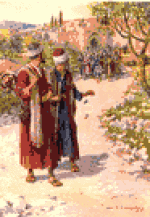 Paul too, shares his experience of this.
Paul too, shares his experience of this.  He reminisces about his life, but ends up, as always, with a statement of victory in Jesus.
He reminisces about his life, but ends up, as always, with a statement of victory in Jesus.  The early believers too, suffered persecution and hardships.
The early believers too, suffered persecution and hardships.  Through John, Jesus spoke to the church in Smyrna about suffering, one of only 2 of the 7 churches He didn't directly criticize.
Through John, Jesus spoke to the church in Smyrna about suffering, one of only 2 of the 7 churches He didn't directly criticize.  If we wish to be those who have the power to overcome satan, sacrifice 'unto death' (Natural and/or spiritual) is required.
If we wish to be those who have the power to overcome satan, sacrifice 'unto death' (Natural and/or spiritual) is required.  The core of our relationship with God centres round 'sacrifice'. Next week we will see how the methods of sacrifice changed through the 3 kingdom ages.
The core of our relationship with God centres round 'sacrifice'. Next week we will see how the methods of sacrifice changed through the 3 kingdom ages.  In our humanity, we all, or nearly all, desire to be prosperous, preferably wealthy, as well as godly! So we are drawn back, as with a magnet, to the measure of success of the second kingdom age. Don't we really, in our heart of hearts, want to be like King Solomon - wise and wealthy? But what came of him? He was entrapped by the world and fell away from God, in spite of being the wisest man who ever lived! What hope is there for us then, when placed in the same situation? Very little.
In our humanity, we all, or nearly all, desire to be prosperous, preferably wealthy, as well as godly! So we are drawn back, as with a magnet, to the measure of success of the second kingdom age. Don't we really, in our heart of hearts, want to be like King Solomon - wise and wealthy? But what came of him? He was entrapped by the world and fell away from God, in spite of being the wisest man who ever lived! What hope is there for us then, when placed in the same situation? Very little.